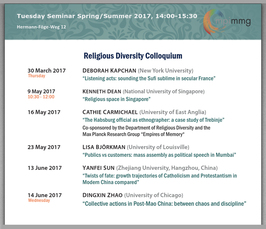"Listening acts: sounding the Sufi sublime in secular France"
Religious Diversity Colloquium Spring/Summer 2017
- Date: Mar 30, 2017
- Time: 02:00 PM - 03:30 PM (Local Time Germany)
- Speaker: Deborah Kapchan (New York University)
- Deborah Kapchan is Associate Professor of Performance Studies at New York University. She is the author of Gender on the Market: Moroccan Women and the Revoicing of Tradition (Univ. of Pennsylvania Press 1996), Traveling Spirit Masters: Moroccan Music and Trance in the Global Marketplace (Wesleyan University Press 2007), as well as numerous articles on sound, narrative and poetics. She is translating and editing a volume entitled Poetic Justice: An Anthology of Moroccan Contemporary Poetry, and is also the editor of two recent volumes: Intangible Rights: Cultural Heritage in Transit (2014 University of Pennsylvania Press) and Theorizing Sound Writing (2017 Wesleyan UP). She is currently writing a book tentatively entitled Listening to Islam: The Festive Sacred and the Islamic Sublime. A Guggenheim fellow, she has also received grants from the Fulbright-Hays Foundation, the Wenner-Gren Foundation, the Social Science Research Council as well as New York University.
- Location: MPI-MMG, Hermann-Föge-Weg 12, Göttingen
- Room: Conference Room

For more details please contact vdvoffice(at)mmg.mpg.de.
What changes when ways of listening, like ways of speaking (Hymes 1974), are recognized as social events? How does attention to listening change cultural analysis and perception, particularly in the tension between secular and sacred ways of being in contemporary France? Following Austin’s theory of speech acts, I define a listening act as listening that actively performs something in the world. In this presentation, I evoke several listening acts that have emerged from my longitudinal research with Sufi Muslims in the Boutshishiyya Qadirriyya order in Morocco and France in order to examine 1) the social instrumentality of listening, 2) its ethnographic capacities, and
3) its political potential. Exploring what I call the “Sufi sublime” in the wake of the Charlie Hebdo attacks in France, I demonstrate that listening acts, whether coded as sacred or secular, restructure the aesthetic ground and thereby effect what Rancière calls a “redistribution of the sensible” (Rancière 2010).